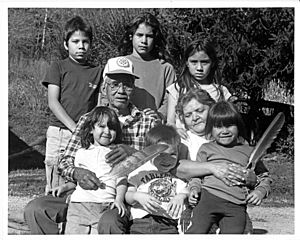Walker Calhoun facts for kids
Quick facts for kids
Walker Calhoun
|
|
|---|---|

Walker (center, in hat) and Evelyn Calhoun with grandchildren, 1989
|
|
| Born | May 13, 1918 Big Cove, North Carolina, U.S.
|
| Died | March 28, 2012 (aged 93) |
| Nationality | Eastern Band Cherokee, American |
| Spouse(s) | Evelyn Calhoun |
| Relatives | Will West Long (paternal uncle) |
Walker Calhoun (born May 13, 1918 – died March 28, 2012) was a very important member of the Eastern Band of Cherokee Indians. He was a talented musician, dancer, and teacher. Walker was also a medicine man and a spiritual leader. He worked hard to keep the history, religion, and traditional healing methods of his people alive. Walker's many skills helped greatly in saving Cherokee traditions.
Contents
Early Life and Learning
Walker Calhoun was born on May 13, 1918. His birthplace was Big Cove, North Carolina. He was the youngest of 12 children. His parents were Sally Ann Calhoun and Morgan Calhoun.
When Walker was nine, his father passed away. Around that time, he stopped going to school. He needed to work on the family farm. At age 12, Walker went to a boarding school. This school was in Cherokee, North Carolina. There, he learned a little English. Before this, he rarely heard English. His mother did not speak it, which was common in the Eastern Cherokee tribe.
Throughout his childhood, Walker learned many things. His Uncle Will West Long taught him Cherokee songs and dances. He learned traditional medicine from his mother. Walker also taught himself to play the banjo during these years.
Walker's Work and Contributions
During World War II, Walker joined the U.S. Army. He served as a Combat Engineer in Germany. After the war, the army sent him to California. Walker married Evelyn Calhoun. Together, they raised 10 children.
Walker worked for the North Carolina Department of Highways. Later, he worked for a plant in Cherokee for about 20 years. He retired at age 62.
In the 1980s, Walker started a group called the Raven Rock Dancers. Through this group, he taught young Cherokee people the songs of his uncle, Will West Long. Some of these important songs are listed below.
| Name | Dance | # of Songs |
| Friendship Dance | yes | 8-9 songs |
| Quale Hunters Dance | yes | 1 |
| Bear Dance | yes | 4 |
| Beaver Hunters Dance | yes | 4 |
| The Medicine song | no | 1 |
In the late 1980s, Calhoun recorded some of these songs. He recorded them at the "Cherokee museum." For his work, he won several awards. These included the "Best folk recordings list" and the "National Heritage Fellows award."
Walker Calhoun was very active in the Eastern Cherokee community. He did not support building casinos on the reservation. He believed they would harm the community. He also helped with efforts to reclaim land.
Lasting Impact and Legacy
Many Cherokee songs and dances were almost lost. This happened after years of efforts by the U.S. Government, missionaries, and educators. They tried to stop native traditions. Walker's deep knowledge of these practices was key. It helped bring Cherokee traditions back to the community.
Walker made his feelings clear. He said, "It was on the verge of going out of existence... I'm gonna try and bring it back if I can." He was central to bringing back Cherokee identity. He did this through his work with the Raven Rock Dancers. He also made several recordings. This means his knowledge can still be heard today.
Walker passed away on March 28, 2012, at 94 years old. Some of his recordings are at Berea College's Hutchins Library. He also made two albums of his songs. These were called Where Ravens Roost and Sacred Songs from Medicine Lake.
Awards and Recognitions
- 1988 - Sequoyah Award: This award honors people who do the most to save and teach Cherokee culture. Calhoun was the first person to receive it.
- 1990 - North Carolina Folk Heritage Award
- 1992 - National Heritage Fellowship from the National Endowment for the Arts

